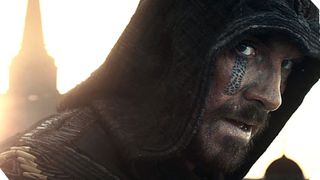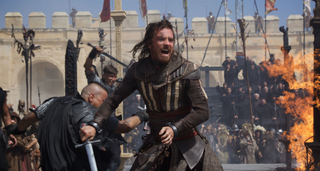The Assassin’s Creed movie is a joyless blur of old ideas
Without any interesting ideas of its own, the movie comes off as a pale imitation of its source material.

Assassin’s Creed should have been a fun movie. In the games, we’ve seen the Revolutionary War, we’ve been a wise-cracking pirate, we’ve had a boss battle with the pope—Assassin’s Creed is necessarily absurd. To be a successful anthology game year after year, Ubisoft has done well to not paint itself into a corner, loosening its grip on the Abstergo framing of their historical ventures with the last few games. I’m cool with neck-stabbing villains throughout history once a year—it’s playful B-grade popcorn filler, and I figured the movie would follow suit.
Surprise: it doesn’t. It’s not the most godawful movie I’ve ever seen—Fassbender is a pro cosplayer, and the action won’t put you to sleep, but Assassin’s Creed fails to bring any interesting new ideas to Ubisoft’s wide open fictional pasture. Worse, it doesn’t adapt the key figures or plots in interesting ways. It’s a blurred reflection of assorted ideas from the games through a cracked mirror, and they’re doing a little dance. Look at them go. Remember Abstergo? Remember running on rooftops? Stabbing grumpy men in the neck? It’s all there, largely unchanged. And as a result, I too left the theater unchanged and unmoved, except for a $13 deficit in my net worth. ($20 if you count the popcorn.)
Everything was permitted
For anyone who's played an Assassin’s Creed game starring Desmond, the premise will feel familiar. Michael Fassbender plays Callum Lynch, a man who is sometimes angry.

There’s not much else to him. As is his talent, Fassbender at least does a good job looking like a troubled man. I love it when a good actor grits their teeth and screams. I think to myself, damn, now that’s acting. There’s spit, a red face, big teeth—the whole rigamarole. He barely sustains an empty, boring central character.
We’re introduced to Callum as a youth trying to jump his trick bike onto a shipping container, but he fails and eats dirt. He goes home and sees his dad wearing a dorky hood holding a bloodied knife next to the corpse of his mother, and then we transition to Callum’s execution by lethal injection without explanation. It’s not made explicit whether Callum was framed or murdered someone else until well into the movie. After fake dying, he wakes up in Abstergo as the supposed genetic key to finding the Apple of Eden and ‘curing violence.’ I suppose Assassin’s Creed is known for daring leaps, but it hurries over building interesting characters and plot in favor of flashing a tenuous sequence of iconic series props and action scenes one after the other.
Callum is thrust into the Animus immediately after arriving at Abstergo, which resembles a post-modern fitness facility, replete with concrete walls, ubiquitous white jumpers, and those big bouncy balls you do ab exercises on. The Animus is a huge claw this time, meant to wave around its subject like a toy doll to replicate whatever movements they’re performing in their genetic memories. It might be the most significant creative liberty of the whole film.
It’s genetic
While the action scenes are fine, there’s nothing particularly novel about them. For Callum, his Assassin ancestor Aguilar de Nerha likes to stab, punch, run, and jump quite a bit, just never quietly, so the Animus has a lot to keep up with. Stealth isn’t a consideration for their order, and nearly every trip into the Animus ends up with their clumsy crew trying to kill a Templar in broad daylight.
Set in the Spanish Inquisition, everything in the historical scenes is caked with dust and forced through an intense yellow filter. Except for a quick title card and a Spanish-speaking cast, the setting does little to establish its time and place.
There’s no time to linger, after all. The Assassins want to kill the Templars over a mind control apple, and most scenes are viewed through quick, blurry action cuts. There’s a chase scene on horseback and another on foot over rooftops, each filled out with swordplay and fistfights. To be fair, it’s an accurate recreation of how most of my assassination attempts go in games.
I never thought I’d miss the relentless nagging of side characters like Shaun Hastings from the earlier games.
It’s the kind of action that films have already explored a thousand times over, and while playing them might be exciting, seeing them adapted to the screen is anticlimactic. The interactions of the Assassin’s Creed games already take inspiration from action movies, and as such, their impact is lessened on the return trip to the big screen. Stabbing is stabbing is stabbing.
By the end, Assassin’s Creed just feels like every other OK action movie, propped up by a superficial connection to the videogame series. It’d be fine if there were interesting characters or occasional doses of humor to shake up its muted, self-serious aesthetic from time to time, but the supporting cast is drab collection of exposition-spouting mannequins. I never thought I’d miss the relentless (and eventually lovable) nagging of side characters like Shaun Hastings from the earlier games. No humans live in this cinematic universe.
Because Assassin’s Creed is so risk averse, it functions at best as a bargain bin collection of lights and noise and punching that might give a huge fan fleeting moments of affection and familiarity, but does nothing to change or elevate the series whatsoever.
PC Gamer Newsletter
Sign up to get the best content of the week, and great gaming deals, as picked by the editors.
James is stuck in an endless loop, playing the Dark Souls games on repeat until Elden Ring and Silksong set him free. He's a truffle pig for indie horror and weird FPS games too, seeking out games that actively hurt to play. Otherwise he's wandering Austin, identifying mushrooms and doodling grackles.
Most Popular





